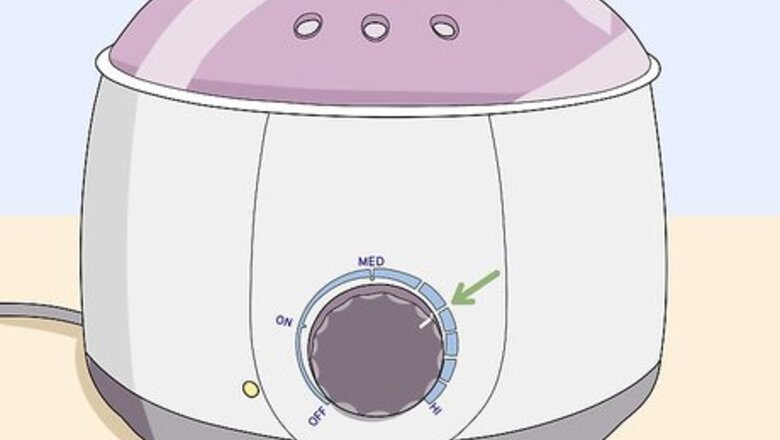
views
Cleaning an Inner Pot
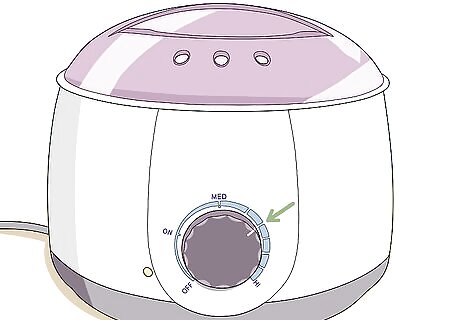
Turn your heat up to a higher setting than you normally use. If you use wax that melts under medium heat, turn your pot up to medium-high. If you’ve been using a wax that melts at medium-high, turn the heat up as high as it will go. The wax has to melt thoroughly before you can clean out the interior pot. Keep your lid open if you can. This will make it easier to monitor your wax as you heat it. Use a higher setting than you normally use to ensure that your wax reaches a thinner consistency than it does when you’re applying or melting it. This will keep older wax buildup from sticking to the sides. On most wax pots, the inner pot is the only portion that you will need to regularly clean.
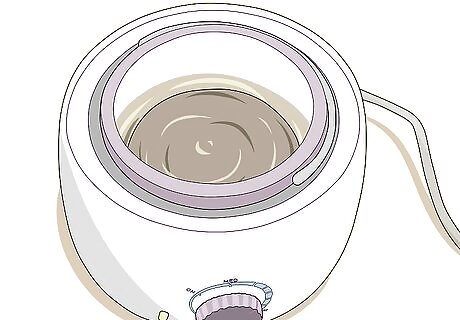
Continue heating until your wax melts. Monitor your wax as it heats and look for bubbles or thin-running wax. Use your brush, mixing stick, or spoon to stir it and check for chunks of solid wax. Continue mixing until the wax is completely melted. Be careful when mixing and heating your wax. The wax can burn you if you get it on your skin. Turn the heat off after the wax has fully melted.
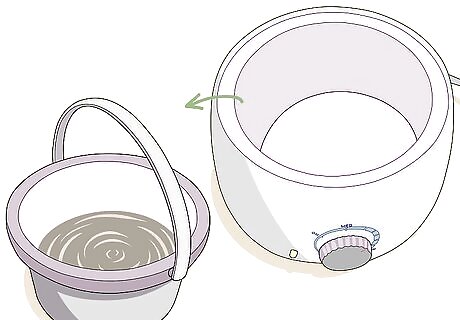
Remove the inner pot safely with the handle, oven mitts, or tongs. If your wax pot has a temperature-safe handle, you can use it to lift the inner bucket out by lifting it out. If there is no handle, use oven mitts or tongs to remove the inner pot. Wear a thick oven mitt on the hand that braces the bottom to prevent yourself from getting burned. This method only works if you have a standard wax pot with a removable inner pot. If you have a one-piece pot, ignore the steps about removing the pot and pour it out by tilting the whole unit.
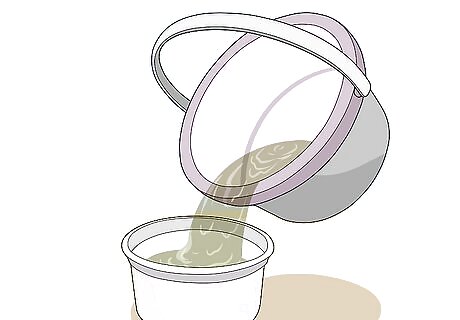
Pour the wax into a disposable container for removal. You cannot pour the wax down the drain, so pour the melted wax into a disposable plastic or metal container. Put a thick towel under the container in case of a spill. Wear oven mitts and tilt your wax over the container to pour it out. Never pour wax down a drain. Large amounts of wax will dry in the pipes and block them. Do not pour the hot wax into a soft plastic or porous material that can leak. You can store the excess wax if you want to use it later.
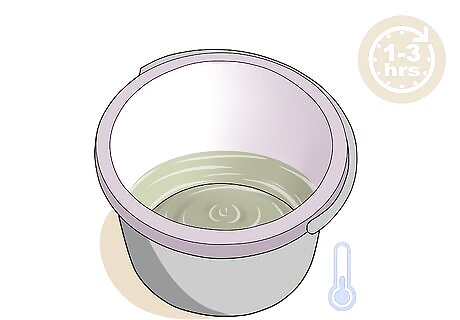
Set the inner pot aside and wait for it to cool. Set the container in a safe place and wait 1-3 hours for the pot to cool off. You can put it on a plate and stick it in the refrigerator if you’d like to accelerate the process as long as your inner pot doesn’t have an electrical component. Granite, glass, and thick rags can all handle heat without much problem.
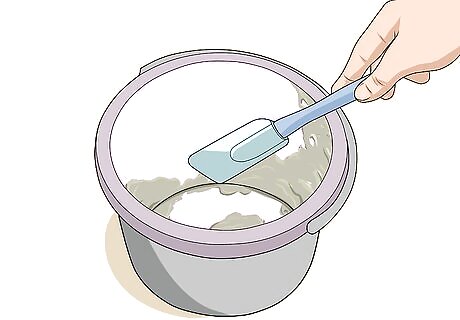
Use a rubber scraper or spatula to remove any remaining wax. Put on a pair of rubber gloves if you want to keep your hands clean. Use a rubber scraper or spatula to scrape any remaining wax off of the interior of your inner pot. Allow the pieces that you scrape out to collect at the bottom of the pot and then dump them out into the trash.Warning: Never use metal or any utensil with a serrated edge to clean wax off or you will risk scratching and damaging the inner pot.
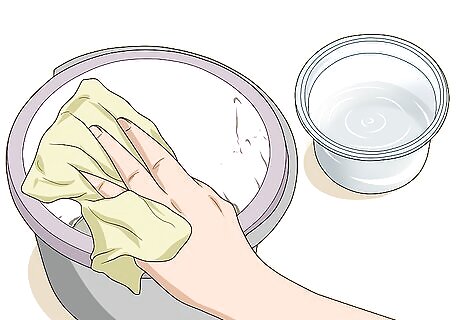
Wipe your pot with wax cleaner or mineral oil and wipe it down. Some wax pots come with a cleaning solution that is specifically designed to remove wax residue from the inner pot. If your pot didn’t, you can use mineral oil to wipe down the inside of your pot. Pour some oil or cleaner on to a paper towel and thoroughly rub it into every surface in your pot. Do not use an acidic cleaner on an inner pot with plastic parts. The cleaner can damage or crack the pot.
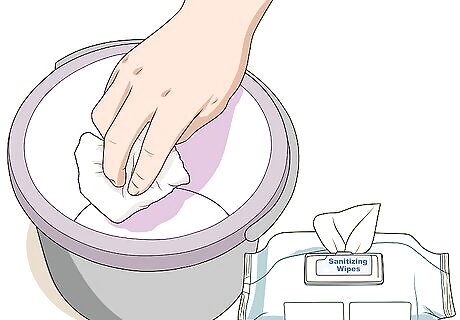
Clean the inside of the pot with a sanitizing wipe or sterilization solution. If you don’t plan on using your pot for a while, you can sterilize or disinfect it. Use a sanitizing wipe or sterilizing solution to wipe down the inside of your pot. While not mandatory, this will keep wax stains from forming in your pot. Let your pot air dry for 3-4 hours before using it again.
Removing Wax from the Rim and Case
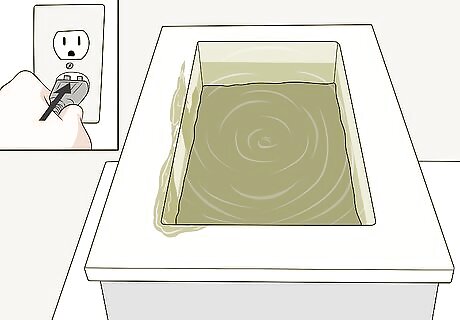
Turn the heat on and make sure that wax is melted. To clean any wax residue that may have gotten on the rim or face of your wax pot, turn the heat on and wait for the wax to melt. Even if your pot is empty, turn the heat on to loosen the wax residue on the outside of the pot. Wear a pair of rubber gloves if you want to keep your hands clean. Once the wax is melted, turn your wax pot off and unplug it.
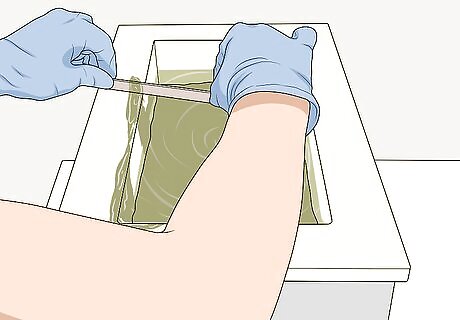
Use a popsicle stick or disposable straight edge to scrape the rim of a pot. Take a popsicle stick and hold it in both hands with the long side horizontal to the pot’s rim. Pinch the flat end on both sides between your thumb and index finger. Use the thin edge of the popsicle stick to scrape wax off the rim of your wax pot. If the wax is totally melted, it will blend in with the rim. You can wipe it up with rubbing alcohol and a paper towel. You can use any small, wooden straight-edge instead of a popsicle stick. Just remember that you’re going to have to throw it out after the wax dries.
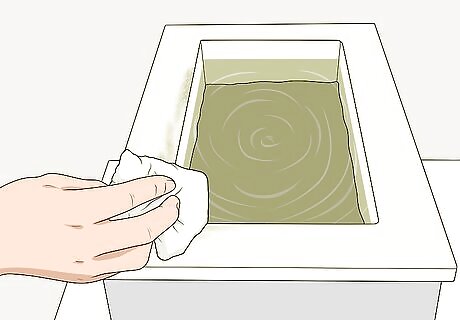
Clean the face and rim of your wax pot with rubbing alcohol and a paper towel. Once you’ve removed any thicker wax, pour some rubbing alcohol into a paper towel. Wipe the rim and face by rubbing in one direction with each swipe to lift the wax up. Clean any knobs or dials by lightly turning them with the paper towel in your hand.Tip: Some waxes will leave a little color behind. This doesn’t mean that your surface isn’t clean though, and the color will likely dissipate as the pot cools. Turn your pot off before you do this. You don’t want to get any active electrical components wet.
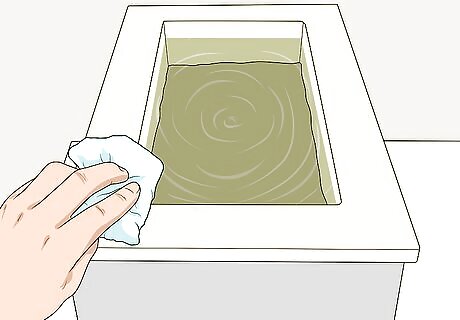
Wipe the entire container with a dry paper towel. You can’t leave the exterior of the pot wet, especially if it has an electrical heating mechanism. Take a few dry paper towels and wipe down every face of your wax pot so that you soak up any residual alcohol or wax. Let you pot air dry for 2-3 hours before using it again.
Washing an Improvised Wax Pot
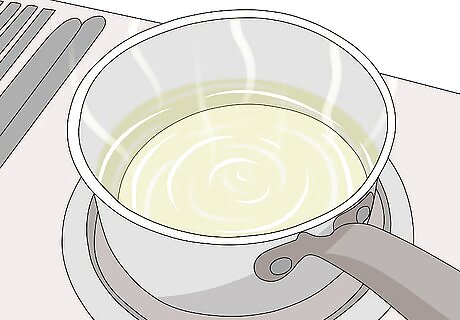
Heat your improvised pot like you normally would to melt the wax. If you have an improvised pot, start the cleaning process by heating the pot the way you normally would. Whether it’s a mason jar or metal container on an electric skillet or standard metal pot on a burner, heat it up the way you normally would to begin melting the wax. Using glass on an electric skillet can cause it to shatter. If this is how you typically melt your wax, consider switching to a metal pot that is designed to withstand heat. You can use a blow-dryer if you don’t have your normal heating method available or heating element is damaged.
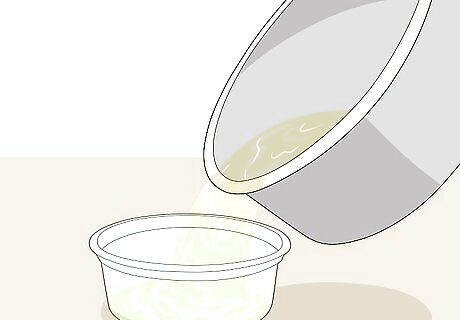
Pour out the liquid wax into a disposable container and throw it out. Once the wax in the container is melted, pour it out into a disposable metal or plastic container. You cannot pour wax down a drain or you’ll risk permanently damaging the pipes. Never put melted wax into a container that may melt when exposed to high heat.
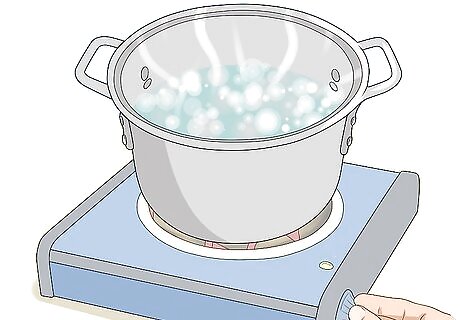
Boil enough water to fill your container. Fill a pot with enough water to fill your container. Place it on the stove and then heat it on high for 10-15 minutes until it reaches a rolling boil. Once the water is boiling, put your wax pot in the sink.
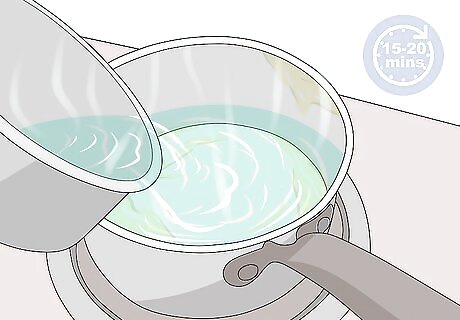
Pour boiling water into your pot and wait 15-20 minutes. Wear oven mitts and lift your pot over the sink. Pour it into the inner pot slowly until there is 1–2 inches (2.5–5.1 cm) of space remaining at the top of the container. If you accidentally fill the wax pot to the point that it overflows, dump some of the water out. Only dump the water out if there aren’t any bits of wax in it.
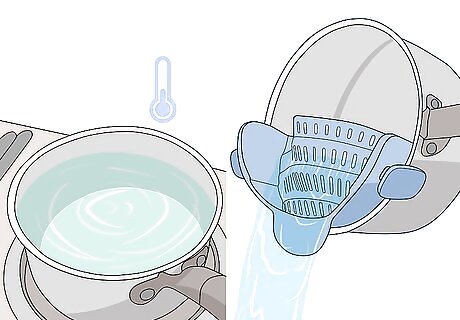
Wait for the water to cool off and then strain the water in a colander. The boiling water will melt the surface of any waxy particles, causing them to float on the surface. As the water cools, the wax will harden again and you will be able to strain the water in a colander. Do this outside or over another pot if you can to prevent wax from getting in a drain. Discard any wax that you don’t want to reuse.
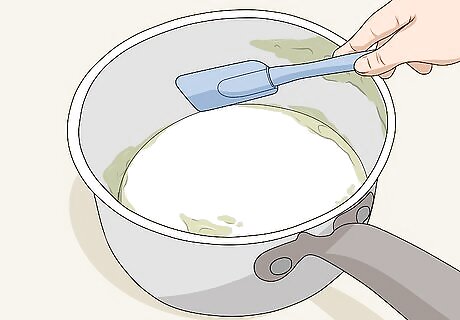
Scrape any remaining wax with a spatula or spoon. Use a wooden spatula or spoon to scrape any residue or remaining bits of wax. If your container is made out of glass, you can use a metal spatula or spoon, but don’t scrape too hard or you’ll risk breaking or cracking the wax.Tip: If your improvised pot has some sharper angles in it, you can get into hard-to-reach areas by using a cotton swab.
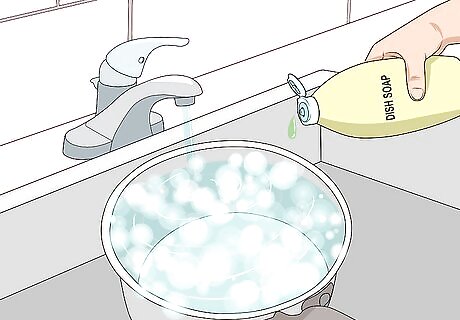
Wash the pot with a mild dish soap and water. Pour a few squirts of mild dish soap into your wax pot and then fill it up with lukewarm water. Scrub the inside of your container with a sponge or clean cloth to remove any remaining wax residue. Empty the water and dry the interior of your wax pot with a clean paper towel. Let your pot air dry for 2-3 hours before using it again. You can repeat this entire process if there is still wax on the inside of your pot.

















Comments
0 comment